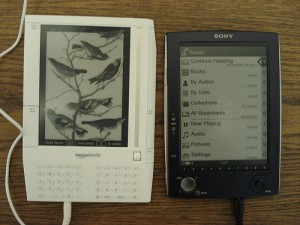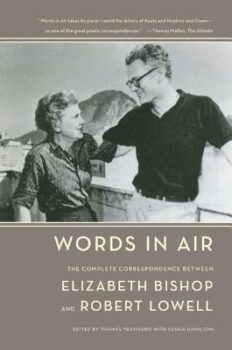
Kindle and Sony e-Reader / photo by jblyberg (flickr cc)
The rise of the Kindle, and the recent advent of competitor e-readers the QUE, the Nook, and the Alex, have sparked much discussion about the future of paper books, publishing, and the universe. But there’s been little discussion about whether e-books are really a good substitute for, you know, book books. The New York Times‘s “Room for Debate” column asked several experts to weigh in:
Is there a difference in the way the brain takes in or absorbs information when it is presented electronically versus on paper? Does the reading experience change, from retention to comprehension, depending on the medium?
The short answer? Yes, and yes–but whether that’s a good thing, a bad thing, or a mixed bag is apparently still up for debate.
From Maryanne Wolf, child psychologist:
The child’s imagination and children’s nascent sense of probity and introspection are no match for a medium that creates a sense of urgency to get to the next piece of stimulating information. The attention span of children may be one of the main reasons why an immersion in on-screen reading is so engaging, and it may also be why digital reading may ultimately prove antithetical to the long-in-development, reflective nature of the expert reading brain as we know it.
From David Gelertner, professor of computer science:
All reading is not migrating to computer screens. So long as books are cheap, tough, easy to “read” from outside (What kind of book is this? How long is it? Is this the one I was reading last week? Let’s flip to the pictures), easy to mark up, rated for safe operation from beaches to polar wastes and — above all — beautiful, they will remain the best of all word-delivery vehicles.
From Gloria Mark, professor of informatics:
Hypertext offers loads of advantages. If while reading online you come across the name “Antaeus” and forget your Greek mythology, a hyperlink will take you directly to an online source where you are reminded that he was the Libyan giant who fought Hercules. And if you’re prone to distraction, you can follow another link to find out his lineage, and on and on. That is the duality of hyperlinks. A hyperlink brings you to information faster but is also more of a distraction.
Reading online is thus not just about reading text in isolation. When you read news, or blogs or fiction, you are reading one document in a networked maze of an unfathomable amount of information. My own research shows that people are continually distracted when working with digital information. They switch simple activities an average of every three minutes (e.g. reading email or IM) and switch projects about every 10 and a half minutes. It’s just not possible to engage in deep thought about a topic when we’re switching so rapidly.
For the long answer, read the entire discussion here.





